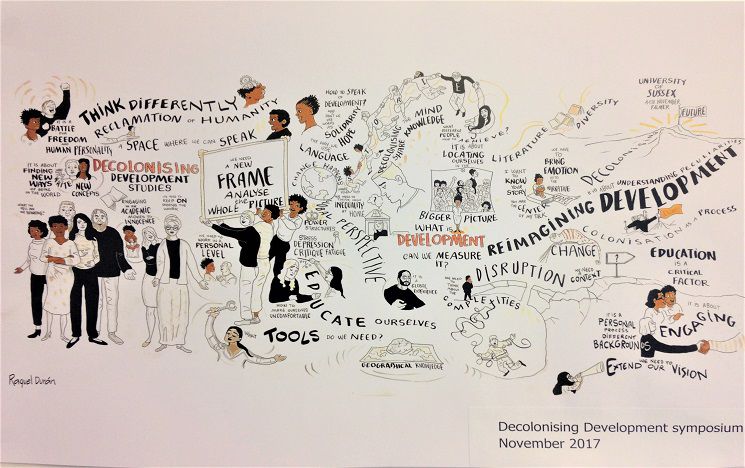Research
CGI research covers a range of issues relating to the generation, maintenance and resolution of global insecurities.

Research Focuses
CGI engages with a wide range of theoretical perspectives and debates in an interdisciplinary fashion; and CGI researchers have extensive thematic, country and regional expertise. CGI researchers' work ranges across the following research themes:
- Acts of curating; art of peace
- Anti-colonial thought and conceptions of the international
- Arms sales and military cooperation
- Climate change and ecological crises
- Colonial violence, dispossession and development
- Embodied/live experiences of insecurity and war
- Feminist science and technology studies
- Gender and sexual based violence
- Genocide
- Geopolitics
- Humanitarianism
- Imaginaries of liberation
- Insurgencies, rebel groups and armed groups
- Militarism, anti- and counter-militarism
- Political economy of Britain’s relations with Gulf states
- Politics and sociology of knowledge production
- Politics of memory
- Public and global health; biotechnology
- ‘Race’ and racism
- Scholarship as civic duty
- War and armed conflict
We are keen to nurture and promote cutting edge work and to facilitate a vibrant research community. To become part of this community and to inform us about your research, contact centre director, Synne Dyvik: s.dyvik@sussex.ac.uk
Recent articles and books by our members
-
Ali, N. (2020) Seeing and unseeing Prevent’s racialized borders. Security Dialogue, 51(6):579-596. doi:10.1177/0967010620903238
Ali, N. Whitham B. (2020) Racial capitalism, islamophobia, and austerity
International Political Sociology, 15(2):190-211
Brenner, D. (2019) Rebel Politics: A Political Sociology of Armed Struggle in Myanmar's Borderlands. Cornell University Press
Brenner, D. (2018). Performing Rebellion: Karaoke as a Lens into Political Violence. International Political Sociology, 12(4), 401-417
Brock A, B Sovacool, A Hooks (2021) Volatile Photovoltaics: Green Industrialization, Sacrifice Zones, and the Political Ecology of Solar Energy in Germany. Annals of the American Association of Geographers
Brock A (2020) 'Frack off': Towards an anarchist political ecology critique of corporate and state responses to anti-fracking resistance in the UK. Political Geography https://www.sciencedirect.com/science/article/pii/S0962629819301192?dgcid=author
Daoust, G., Dyvik, S.L. (2021). ‘Reconceptualizing Vulnerability and Safeguarding in the Humanitarian and Development Sector’, Social Politics: International Studies in Gender, State & Society, ONLINE FIRST. https://doi.org/10.1093/sp/jxaa040
Daoust, G., Dyvik, S.L. (2020). ‘Knowing safeguarding: The Geopolitics of knowledge production in the humanitarian and development sector. Geoforum. 112, June 2020, pp: 96-99. https://doi.org/10.1016/j.geoforum.2020.02.015
Evans, S. W., Leese, M., & Rychnovská, D. (2021). Science, technology, security: Towards critical collaboration. Social Studies of Science, 51(2), 189-213
Howell, A. Richter-Montpetit, M. (2020) “Is Securitization Theory Racist? Civilizationism, Methodological Whiteness and Antiblack thought in the Copenhagen School.” Security Dialogue, 51(1): 3-22
Howell, A. Richter-Montpetit, M. (2019) “Racism in Foucaultian Security Studies: Biopolitics, Liberal War and the Whitewashing of colonial and racial violence.” International Political Sociology, 13, 2-19
Ortmann, Stefanie and Whittaker, Nick (2021) Geopolitics and grand strategy. In: Baylis, John, Wirtz, James J and Gray, Colin S (eds.) Strategy in the Contemporary World, 7th edition. Oxford University Press
Ortmann, Stefanie (2020) Spheres of influence. In: Moisio, Sami, Koch, Natalie, Jonas, Andrew E G, Lizotte, Christopher and Luukkonen, Juho (eds.) Handbook on the changing geographies of the state: new spaces of geopolitics. 2020 . Edward Elgar Publishing, pp. 313-324. ISBN 9781788978040
Rychnovská, Dagmar (2021) ‘Anticipatory Governance in Biobanking: Security and Risk Management in Digital Health’. Science and Engineering Ethics, 27(3), 1-18
Stavrianakis, A (2020) “Requiem for Risk: Non-knowledge and domination in the governance of weapons circulation,” International Political Sociology, 14(3): 233-251
Stavrianakis, A (2019) “Controlling weapons circulation in a postcolonial militarised world,” Review of International Studies”, 45(1): 57-76
Tabar, L and S. Botmeh. (2020). “Real East Development Through Land Grabs: Predatory Accumulation and Precarity in Palestine.” New Political Economy, published online November 2020, 1-14. https://www.tandfonline.com/doi/full/10.1080/13563467.2020.1849083
Tabar, L. (2017). “From Third World Internationalism to ‘The Internationals’: The Transformation of Solidarity with Palestine.” Third World Quarterly, 38:2, 414-435
Wise, L. (2021). ‘The Genocide-Ecocide Nexus in Sudan: Violent “Development” and the Racial-Spatial Dynamics of (Neo)Colonial-Capitalist Extraction’. Journal of Genocide Research, 23(2): 189-211. https://www.tandfonline.com/doi/full/10.1080/14623528.2021.1887057
Wise, L. (2017). ‘Social Death and the Loss of a World: An Anatomy of Genocidal Harm in Sudan.’ International Journal of Human Rights, 21(7): 838-865. https://www.tandfonline.com/doi/full/10.1080/13642987.2017.1310464?needAccess=true
Photo credit: Decolonising Development Symposium 2017: Raquel Duron